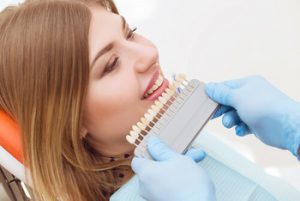Dental veneers are thin shells, typically made of porcelain or composite materials, that adhere to the front surface of teeth. Their primary purpose is to enhance the overall appearance of your smile, providing a brighter smile by covering imperfections in the teeth. But the longevity of your veneers largely depends on proper care.
Maintaining good oral hygiene habits is paramount when you have veneers. Like regular teeth, veneers can be susceptible to tooth decay, gum disease, and tartar build-up if there’s insufficient dental care. Can you brush veneers once a day? Ideally, you should brush your teeth twice daily, using a soft toothbrush with soft bristles and non-abrasive toothpaste. Electric toothbrushes, if used gently, can also be an excellent tool. Floss daily to remove build-up plaque and avoid alcohol consumption in large quantities, which can weaken the bonding cement.
Protect teeth with veneers from direct pressure. Avoid chewing hard objects, such as hard candy or hard bread. Avoid foods like soy sauce that aren’t stain-resistant. Good oral hygiene also means avoiding teeth grinding. If you have a grinding habit, consider treatment options to protect your beautiful smile.
Lastly, visit your dentist regularly. Regular checkups help ensure that your veneers and the natural teeth and gums behind them remain healthy. Schedule your veneer consultation or dental checkup appointment today!
Different Types of Veneers
 When it comes to dental veneers, understanding the available types can help you make an informed choice that best suits your needs. At its core, a veneer is a thin shell that is permanently bonded to the front surface of the tooth, aiming to enhance its overall appearance.
When it comes to dental veneers, understanding the available types can help you make an informed choice that best suits your needs. At its core, a veneer is a thin shell that is permanently bonded to the front surface of the tooth, aiming to enhance its overall appearance.
Porcelain Veneers: These are the most popular type of veneers. Porcelain veneers are renowned for their durability and stain-resistant qualities. While they might require the removal of a small amount of enamel underneath, their longevity and the brighter smile they provide are worth the investment. Regular check-ups with your dentist are essential to ensure the bonding agent remains robust.
Composite Veneers: Made from a bonding composite, composite veneers can often be applied in a single appointment. They are less expensive than porcelain veneers but are less stain-resistant and may not last as long. However, with good oral hygiene habits, their lifespan can be extended.
Remember, no matter the type of veneer, maintaining good oral hygiene is paramount. Brush your teeth twice a day using a soft-bristled toothbrush and non-abrasive toothpaste. And, don’t forget to floss daily and visit your dentist regularly for check-ups.
Understanding Dental Veneers: Structure and Composition
Dental veneers have transformed the world of cosmetic dentistry, giving many a chance at a beautiful smile. But what exactly are they, and how do they integrate with our natural teeth?
Dental veneers, often made of porcelain or composite veneers, are thin shells designed to cover the front surface of teeth. Their primary purpose is to improve the overall appearance of teeth that might be discoloured, chipped, or misaligned. Porcelain veneers are notably stain-resistant, offering a brighter smile for those who indulge in certain foods like soy sauce or large quantities of tea and coffee.
One may wonder, “Can you brush veneers once a day?” Well, to maintain the longevity of your veneers, it’s crucial to brush your teeth regularly, ideally twice a day, with a soft toothbrush. Good oral hygiene habits are indispensable, especially when considering the enamel underneath these veneers. It’s equally crucial to use non-abrasive toothpaste and to visit your dentist regularly for a checkup, ensuring the health of both the veneers and the regular teeth beneath.
Bonding these veneers to the existing teeth involves a durable bonding agent. This bonding cement ensures the veneers are permanently bonded to the front of your natural teeth. For those curious about a veneer consultation, it’s essential to understand that veneers are more than a cosmetic solution. They also help protect teeth from potential tooth decay, especially if one has had a history of insufficient dental care.
To protect your investment and ensure the longevity of your veneers, it’s recommended to avoid hard foods or objects, avoid chewing on things like hard candy or hard bread, and avoid teeth grinding. Visiting your dentist for regular checkups and maintaining good oral hygiene is the ticket to a lasting, beautiful smile.
Can You Brush Veneers Once a Day?
One of the most common questions individuals have after getting dental veneers is, “Can you brush veneers once daily?” While dental veneers, whether porcelain veneers or composite veneers are designed to be durable and stain-resistant, their longevity relies on proper care.
Brushing veneers is akin to brushing natural teeth. To maintain optimal oral health, brushing your teeth twice a day is recommended. This ensures the removal of food particles, prevents tartar build-up, and avoids tooth decay. A single daily brush might leave residues, risking tooth decay and gum disease.
A soft toothbrush with bristles is crucial to avoid scratching the veneer’s front surface. Non-abrasive toothpaste and electric toothbrushes with soft settings are also ideal. Moreover, floss daily and consider fluoride mouthwash for a more thorough cleaning.
Hard objects like hard candy or hard bread might damage veneers. It’s essential to avoid chewing these and grinding your teeth. If grinding is an issue, consult with your dentist for treatment options.
Diet plays a role, too. While veneers are stain-resistant, consuming large quantities of certain foods or beverages, such as soy sauce, can lead to discolouration over time. Alcohol consumption should also be monitored as it can weaken the bonding agent.
Visiting your dentist regularly is indispensable not just for a checkup on the veneers but also to ensure the health of the underlying enamel and gums. Insufficient dental care could lead to gum recession and other oral health issues. A veneer consultation is a good time to discuss your oral hygiene habits and get personalised advice to maintain that beautiful smile.
Proper Brushing Techniques for Veneers
For those who’ve invested in the allure of dental veneers, ensuring their longevity with the correct care routine is vital. Dental veneers, whether porcelain or composite, require a special touch to maintain sparkle and function.
The question, “Can you brush veneers once daily?” often arises among veneer owners. In reality, just like natural teeth, veneers benefit from being brushed twice daily. When you brush your teeth, choosing the right tools and techniques is essential. A soft toothbrush, especially those with soft bristles, is highly recommended. This helps protect the veneers and the enamel underneath from undue wear and potential damage.
Non-abrasive toothpaste is the ideal companion to a soft toothbrush, ensuring the veneers aren’t subjected to harsh elements that might compromise their shine or bond to the existing teeth. While brushing, the motion should be gentle, and direct pressure should be avoided. Think of it as massaging your teeth rather than scrubbing them. Hard-bristled toothbrushes can damage the delicate front surface of veneers, leading to a reduced lifespan and a less-than-bright smile.
Maintaining good oral hygiene habits goes beyond just brushing. It’s equally crucial to floss daily, avoid teeth grinding, and visit your dentist regularly for checkups. Proper care ensures the teeth stay healthy and the dental veneers look pristine. Veneers can provide a beautiful smile for years with the right oral hygiene habits.
Daily Care Beyond Brushing
When you invest in dental veneers, either porcelain veneers or composite veneers, their care goes beyond just brushing. Maintaining a beautiful smile requires embracing a full spectrum of oral hygiene habits.
 Firstly, flossing with veneers is crucial. Like natural teeth, veneers also need regular flossing to remove build-up plaque between teeth and to protect teeth from potential gum disease. Flossing daily prevents tartar build-up on the front surface of the veneer and the surrounding teeth, ensuring their longevity.
Firstly, flossing with veneers is crucial. Like natural teeth, veneers also need regular flossing to remove build-up plaque between teeth and to protect teeth from potential gum disease. Flossing daily prevents tartar build-up on the front surface of the veneer and the surrounding teeth, ensuring their longevity.
Next, let’s address mouthwash. A common question is its effect on veneers. While fluoride mouthwash can benefit natural teeth by strengthening enamel underneath, some mouthwashes with high alcohol content can weaken the bonding agent of composite veneers. Always choose a gentle mouthwash on your veneers and consult your dentist on suitable options.
Lastly, although porcelain veneers are stain-resistant, they aren’t entirely stain-proof. Consuming certain foods and drinks, such as soy sauce, can gradually cause discolouration. Coffee, tea, and red wine are also culprits. Smoking is another factor to consider. For the longevity of your veneers and a consistently brighter smile, being conscious of these factors is crucial.
Always remember to visit your dentist regularly for checkups. This promptly addresses any early signs of gum recession, tooth decay, or other dental issues. Proper care and good oral hygiene habits extend the life of both your natural teeth and veneers.
The Impact of Over or Under Brushing
The journey to a brighter smile with dental veneers, whether porcelain or composite, calls for a meticulous oral care regimen. Brushing too much or too little can have surprising repercussions on veneers.
Brushing your teeth more than advised can cause undue wear and tear, especially if you are not using a soft toothbrush. Dental veneers are thin shells designed to enhance your smile; they’re not invincible. Over-brushing can wear down these veneers, affecting their stain-resistant nature and making the bonding composite less effective over time.
Conversely, not brushing enough can wreak havoc on veneers and regular teeth. Plaque can build up, leading to gum recession, gum disease, and tooth decay. With veneers, maintaining good oral hygiene is not just about keeping the veneers looking good but ensuring your overall oral health remains optimal.
For ideal veneer care, brush twice a day gently, using non-abrasive toothpaste and a toothbrush with soft bristles. And remember, regular visits to your dentist are just as crucial. Proper care ensures the longevity of your veneers and helps you sport that beautiful smile with confidence.
Additional Protective Measures for Veneers
Dental veneers, whether porcelain or composite veneers require more than just daily brushing for optimal longevity. They invest in your smile, and safeguarding them goes beyond regular oral hygiene habits.
Protective measures like mouthguards are indispensable for individuals involved in sports or those known to grind their teeth. Avoid teeth grinding, not just for the longevity of your veneers but also to protect your natural teeth from undue wear. A custom-fitted mouthguard can be an excellent way to avoid grinding and protect your investment.
Moreover, the importance of regular dental checkups should be emphasised. Visiting your dentist regularly is essential to monitor the health of both the veneers and the underlying natural teeth. A checkup can identify early signs of gum disease, potential bonding agent issues, or other complications.
Lastly, while maintaining good oral hygiene at home is pivotal, professional cleanings are equally vital. Such cleanings remove build-up plaque more efficiently, prevent tartar build-up, and allow your dentist to inspect the dental veneer and ensure its bonding composite remains strong.
The Longevity of Veneers: What to Expect
 When contemplating dental veneers, many ask, “How long will they last?” With proper care, the longevity of your veneers can span over a decade. Both porcelain veneers and composite veneers, if well-maintained, can serve their primary purpose of enhancing your smile for many years.
When contemplating dental veneers, many ask, “How long will they last?” With proper care, the longevity of your veneers can span over a decade. Both porcelain veneers and composite veneers, if well-maintained, can serve their primary purpose of enhancing your smile for many years.
Several factors affect their lifespan. Good oral hygiene habits are paramount, including brushing your teeth twice daily with a soft toothbrush and non-abrasive toothpaste. However, tooth decay, gum disease, and the buildup of plaque can compromise the bonding agent and reduce their longevity. It’s also essential to avoid teeth grinding and to be cautious when consuming hard foods.
Regular checkups with your dentist are crucial to keep veneers in optimal condition. With dedication to oral health and visits to your dentist regularly, you can ensure your veneers keep their stain-resistant shine and protect your beautiful smile.
Common Myths and Misconceptions about Veneer Care
With the growing popularity of dental veneers, misconceptions about their care are inevitable. Let’s debunk some of the most common myths to ensure that your smile remains radiant and the longevity of your veneers is maximised.
Myth 1: “You can only brush veneers once a day.”
Truth: Like natural teeth, veneers require brushing at least twice daily. Good oral hygiene habits are essential, not only for your veneers but also for your overall oral health.
Myth 2: “Porcelain veneers are stain-resistant so you can consume any foods or drinks.”
Truth: While porcelain veneers are more stain-resistant than composite veneers, avoiding foods and drinks that can stain, such as soy sauce or large quantities of coffee, is still recommended.
Myth 3: “Dental veneers don’t require regular checkups.”
Truth: Regular dental checkups are essential to monitor the bonding agent’s state and the health of the existing teeth underneath the veneers.
Myth 4: “Electric toothbrushes or toothpaste with baking soda damage veneers.”
Truth: Using a soft-bristled electric toothbrush and non-abrasive toothpaste can be part of proper veneer care. The primary purpose is to avoid hard-bristled toothbrushes that can cause wear.
Myth 5: “Veneers protect teeth from decay.”
Truth: Veneers are thin shells bonded to the tooth’s front surface. The enamel underneath can still be susceptible to tooth decay without proper oral hygiene.
Conclusion: Prioritising Veneer Health for a Beautiful Smile
Achieving a dazzling smile through dental veneers, be it porcelain or composite veneers, is just the beginning. The real challenge lies in preserving that radiant look over the years. Daily care and routine maintenance are integral to your veneers’ lasting beauty and health.
Brushing your teeth twice a day with a soft toothbrush and non-abrasive toothpaste, complemented by good oral hygiene habits, can be your arsenal against threats like tooth decay, gum disease, or the buildup of plaque. Similarly, while dental veneers are stain-resistant, it’s crucial to be mindful of consuming large quantities of certain foods and beverages, such as soy sauce or alcohol, which might mar their appearance.
Moreover, it’s paramount to visit your dentist regularly. Regular dental checkups ensure early detection of any issues that might impact the longevity of your veneers. Beyond Infinity Dental, with its team of experts, is dedicated to helping you maintain good oral hygiene and ensure your veneers remain impeccable.
For an appointment today and a veneer consultation to discuss maintaining the lustre and health of your veneers, reach out to Beyond Infinity Dental. Call us on (02) 8806 3799 to prioritise the health and beauty of your smile!
References:
https://www.ncbi.nlm.nih.gov/pmc/articles/PMC6076883/
https://www.webmd.com/oral-health/veneers
www.dentalnews.com/2023/07/14/understanding-porcelain-veneers-a-comprehensive-guide.
https://www.healthline.com/health/composite-veneers
https://www.verywellhealth.com/veneers-5218581











